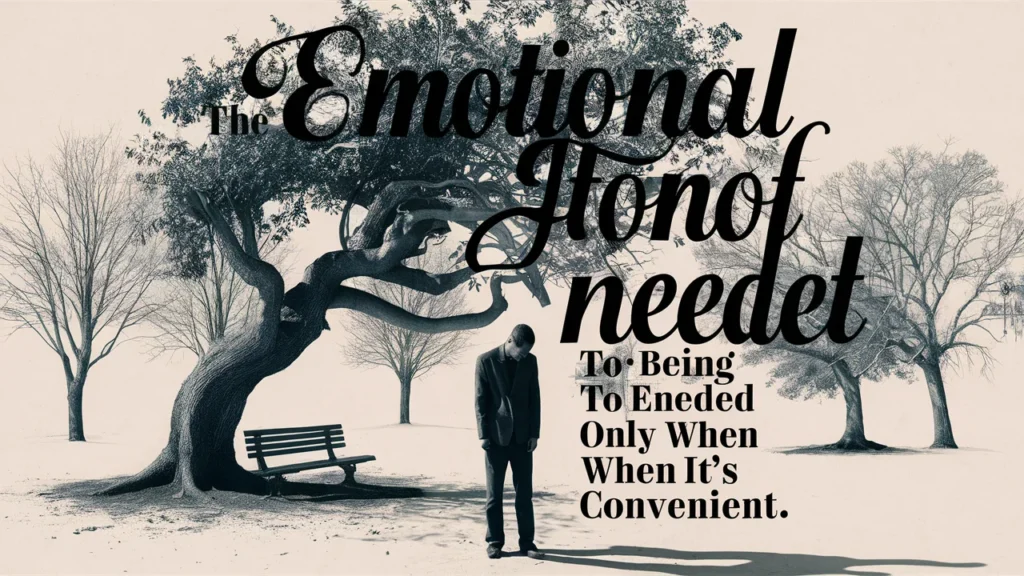Discover heartfelt Only When They Need You quotes that resonate with your emotions. Explore powerful words on trust, loyalty, and self-worth. The concept of being needed by others is an intriguing one that speaks to the depth of human relationships, our sense of value, and how we define connection.
Many of us have experienced moments when we feel truly needed, and then there are times when our presence is only acknowledged when someone needs something from us. These quotes explore the nuances of those dynamics, providing insight into the complexities of being appreciated, relied upon, and sometimes taken for granted.
In this collection, we reflect on how people tend to reach out to others only when they need something, and what that teaches us about the nature of our connections. Let’s dive into these thought-provoking quotes and see what they reveal about our human relationships.
When You Are Only Needed for Convenience
- “They’ll only come to you when they need something, and when they don’t, you’re forgotten.”
- “Being needed is not the same as being wanted-sometimes, you’re just convenient.”
- “Some people only reach out when they need a favor, not because they care.”
- “It’s hard to know who values you when you’re only needed in times of crisis.”
- “You’re not important until they need you for something they can’t handle alone.”
- “People will remember you when they need you, but forget you when they’re fine.”
- “Being useful is not the same as being valued.”
- “Sometimes, the only time you matter is when you’re of use to someone else.”
- “People don’t appreciate you until they need something only you can provide.”
- “Don’t mistake being needed for being loved; they can be two very different things.”
- “Some people treat you like a tool there when they need to fix something.”
- “You know who your real friends are when you stop being needed.”
- “If they only remember you when they need something, you’re not as important as you think.”
- “We all want to feel important, but sometimes we are only valued for what we can give.”
- “Being the go-to person isn’t always a compliment; sometimes it just means you’re convenient.”
- “It’s frustrating to realize that you’re not truly cared for, but only needed for your help.”
- “People who only reach out when they’re in trouble never truly understand your worth.”
- “You realize who your real friends are when they never ask for anything from you.”
- “Those who only need you in a time of crisis will never understand the true value of your presence.”
- “People will come when they need something, but leave when they have what they want.”
The Strain of Always Being Needed

- “Being the one people turn to all the time can feel more like a burden than a blessing.”
- “You can’t keep giving yourself to others if you’re never given anything in return.”
- “It’s exhausting being the only person others rely on, only to feel invisible when they’re okay.”
- “Being needed is draining when you feel like your needs are never acknowledged.”
- “Sometimes, the pressure of always being needed can wear you down until you break.”
- “The hardest part about always being needed is that you rarely get the time to need anyone yourself.”
- “Being the person people always need can feel isolating, like you’re only valuable in times of crisis.”
- “You can’t pour from an empty cup, yet people will still expect you to give.”
- “Constantly being needed can make you forget what it’s like to be cared for in return.”
- “The more you’re needed, the less time you have for yourself until you’re left with nothing.”
- “When everyone needs you, it’s easy to forget that you deserve care and support, too.”
- “You become more than just a person to others become a lifeline they don’t always appreciate.”
- “Sometimes, being needed constantly leaves no room for you to express your pain.”
- “It’s hard to ask for help when you’re always the one who’s expected to give it.”
- “The more they need you, the more invisible your needs become.”
- “The expectation that you’ll always be there for others can eventually drain your energy and self-worth.”
- “You can’t keep sacrificing yourself for others if they’re never there when you need them.”
- “It’s not about being needed- it’s about being valued, and there’s a big difference.”
- “People may need you, but that doesn’t mean they understand the toll it takes on you.”
- “The most exhausting part of always being needed is that your own emotions are often neglected.”
When They Only Need You for Support
- “Some people only reach out when they need a shoulder to cry on, not when you need one.”
- “Being needed for support is a delicate balance-you’re there for them, but who’s there for you?”
- “They seek you out when they’re struggling, but disappear when everything’s fine.”
- “It’s frustrating to be someone’s emotional crutch while feeling unsupported in your struggles.”
- “They need you for strength, but forget that you need care too.”
- “You are only as valuable to them as your ability to help them through their pain.”
- “Sometimes, people only reach out when they need emotional support, and vanish when you need a friend.”
- “It’s exhausting to always be the one who provides support without receiving any in return.”
- “When people only come to you for emotional support, you begin to feel like a therapist, not a friend.”
- “Support is meant to be mutual, but when it’s one-sided, it can leave you feeling drained.”
- “They lean on you in their darkest moments but never offer you the same when you’re in need.”
- “Being someone’s emotional support is an honor, but it shouldn’t come at the expense of your well-being.”
- “You learn that some people only need you for your emotional strength, not for who you are.”
- “Sometimes, it feels like you’re just a resource for others to use when they’re at their lowest.”
- “It’s hard to keep being there for others when they don’t acknowledge your need for support.”
- “They call you when they need to talk, but when it’s your turn, they’re nowhere to be found.”
- “Your support is vital to them, but they don’t realize how much you need support too.”
- “Sometimes, you’re their lifeline, but who holds you up when you’re falling apart?”
- “True friendship involves giving and receiving support, not just one-sided emotional labor.”
- “When you are the one always providing support, you forget what it feels like to be truly heard.”
When You Realize You’re Only Needed for Your Help
- “You start to see that people only come to you when they need something, not because they care.”
- “Being needed for help is different from being needed for your presence.”
- “It hurts to realize that you’re only valued when you’re useful to someone else.”
- “Some people treat you like a useful only when it benefits them.”
- “You’re only remembered when someone needs your expertise or assistance.”
- “When people only call on you when they need help, it makes you question your worth in their eyes.”
- “Being needed for help often feels more like being taken for granted than being appreciated.”
- “You’re only considered important when you can provide something that others can’t.”
- “It’s easy to feel disposable when you’re only needed for what you can do, not who you are.”
- “People often forget to acknowledge you until they need something you can give.”
- “Sometimes, people only see you for what you can offer them-not for the person you are.”
- “It’s painful when you realize that you are only needed when someone is in trouble, and never just for your company.”
- “People will take your help, but they won’t take the time to give back.”
- “When you’re only needed for your assistance, it can feel like you’re a means to an end.”
- “Being needed for what you can do can make you feel like a commodity rather than a person.”
- “It’s hard to keep giving your help when you realize it’s not being reciprocated.”
- “Sometimes, the realization hits that people only reach out when they need something from you.”
- “It’s difficult to see your value in others’ eyes when you’re only seen as useful when there’s a need.”
- “You know that you’re being taken for granted when people only seek you out when they need help.”
- “It feels like you’ve become invisible until someone needs something you can provide.”
When You Realize Your Self-Worth
- “Don’t let anyone treat you as if you’re only valuable when they need something from you.”
- “True self-worth comes from knowing that you matter, not just when you’re useful.”
- “Recognize your value, even when others only see your worth as a resource.”
- “When you stop letting others define your worth, you reclaim your power.”
- “Your value is not determined by how much you can give to others-it’s inherent in who you are.”
- “Stop allowing others to define your worth by how much you can do for them.”
- “Self-worth comes from within, not from being needed by others.”
- “You are more than what others can take from you-your worth doesn’t depend on it.”
- “When you recognize your value, you stop allowing people to take advantage of your kindness.”
- “Being needed by others doesn’t make you worthy; your inherent value does.”
- “Self-worth isn’t about being needed; it’s about being seen and valued for who you are.”
- “You deserve love and appreciation, even when you’re not being called upon for help.”
- “True self-worth is found in being loved for yourself, not just for what you can do for others.”
- “Don’t wait for others to see your worth-recognize it in yourself.”
- “You deserve respect, not just when you’re useful, but for being the person you are.”
- “Knowing your value means no longer tolerating being treated as if you’re only needed when convenient.”
- “When you see your worth, you stop allowing others to take you for granted.”
- “Your worth doesn’t depend on being constantly needed- it depends on your inherent dignity.”
- “True self-worth comes when you realize you’re enough, even without being needed all the time.”
- “Recognizing your worth means not letting people treat you as disposable when you’re no longer needed.”
The Emotional Toll of Being Needed Only When It’s Convenient

- “It’s emotionally draining to be the one they turn to only when it’s convenient for them.”
- “When you’re only needed for a specific purpose, it leaves you feeling invisible and unimportant.”
- “The emotional burden of being needed for convenience is that you never get to rest from the demands of others.”
- “Being the go-to person when it’s easy for others can leave you questioning your role in their lives.”
- “When you’re only needed when it’s convenient, it can be hard to understand where you truly stand in someone’s heart.”
- “They don’t realize the emotional toll it takes on you when they only need you at their convenience.”
- “It’s emotionally exhausting to be always ready to help but never truly appreciated.”
- “The pain of being needed only when convenient is knowing that you’re only acknowledged when you’re of use.”
- “You give so much, but when you’re the one needing, they’re never around.”
- “People forget that the emotional energy you invest in them is not unlimited, especially when it’s only needed at their convenience.”
- “When they only call when they need something, you start to feel like a backup plan rather than a priority.”
- “The emotional toll of being needed only when convenient is that you’re often left feeling abandoned when you’re not useful.”
- “It’s painful when you realize that the connection you thought was mutual is only active when they need you.”
- “Being needed only when it suits them can make you feel like you’re just a placeholder in their lives.”
- “When your emotional energy is only appreciated when they need something, it creates an imbalance that’s hard to ignore.”
- “People don’t always see the emotional labor involved in always being there when they need you, but never when you do.”
- “The cost of always being there for others when they need you is often the loss of your emotional well-being.”
- “Being needed only for convenience can create an emotional distance that becomes harder to bridge with time.”
- “It’s easy to get lost in the role of being the one they turn to when it’s convenient, forgetting that you deserve better.”
- “When people rely on you only when they need something, you can begin to feel emotionally depleted and unimportant.”
The Difference Between Being Needed and Being Wanted
- “There’s a significant difference between being needed and being wanted; one is about dependence, the other about desire.”
- “Being needed can feel like an obligation, but being wanted feels like a gift.”
- “When they need you, it’s often because they can’t do it alone; when they want you, it’s because they choose you.”
- “You deserve to be wanted, not just needed for what you can do for others.”
- “Being wanted is a choice, while being needed is often out of necessity.”
- “People who need you may only care about what you can provide, while those who want you value you for who you are.”
- “The difference between being needed and wanted is that the latter makes you feel valued as a person.”
- “It’s not enough to be needed; you deserve to be wanted, too.”
- “Being needed might make you feel useful, but being wanted makes you feel irreplaceable.”
- “When you are wanted, it’s because someone enjoys your presence, not just your help.”
- “People may need you for what you can do, but they will want you for who you are.”
- “Being needed can leave you feeling like an option, but being wanted shows you’re a priority.”
- “The value of being wanted is that it gives you a sense of belonging, not just functionality.”
- “When you’re only needed, it feels like a transactional relationship, but when you’re wanted, it’s a connection based on affection.”
- “You’re not just there to meet their needs-you’re there because you matter to them.”
- “The beauty of being wanted is that it comes without the pressure of obligation.”
- “Being needed can make you feel like a tool, but being wanted makes you feel like a person.”
- “True happiness in relationships comes from being wanted, not just being needed.”
- “Being wanted shows that your presence is desired, not just your assistance.”
- “You’re more than just a source of help or support you are worthy of being wanted for who you truly are.”
Learning to Let Go of People Who Only Need You When It’s Convenient
- “Sometimes, you have to let go of people who only need you when it’s convenient for them.”
- “Letting go of people who only come around when they need something is the first step toward valuing yourself.”
- “When someone only reaches out when they need something, it’s a sign that it’s time to let go.”
- “You can’t keep holding on to people who don’t value your presence unless it’s for their convenience.”
- “Letting go of toxic relationships is not about being angry- it’s about understanding your worth.”
- “It’s hard to let go, but holding on to people who only need you when it’s convenient will never bring you peace.”
- “Letting go of those who only value you when they need something is necessary for your emotional well-being.”
- “You don’t have to chase people who only want you when they’re in trouble.”
- “Letting go of people who use you for convenience makes space for healthier, more balanced relationships.”
- “Sometimes, the hardest part of letting go is realizing that they only needed you for what you could give, not for who you are.”
- “When you let go of people who only need you for their convenience, you free yourself to build better connections.”
- “It’s liberating to stop being someone’s backup plan and start being someone’s priority.”
- “Letting go doesn’t mean you’ve failed-it means you’ve finally recognized your worth.”
- “When you let go of those who only need you when it’s convenient, you make room for people who genuinely care.”
- “It’s time to move on from relationships where you’re only valued for your utility.”
- “Letting go is about realizing that your worth isn’t tied to someone else’s need for you.”
- “The more you let go of those who only reach out when it’s convenient, the more you open up to real love and respect.”
- “Letting go doesn’t mean you’re giving up on people-it means you’re giving up on being used.”
- “Sometimes, you have to let go of people who only need you when it’s easy for them, not because they appreciate you.”
- “It’s healthier to let go of relationships that only thrive when you’re useful to someone else.”
The Realization That You Deserve More Than Being Needed
- “You deserve to be wanted for who you are, not just for what you can do for others.”
- “When you start to realize your worth, you understand that being needed is not enough to deserve to be cherished.”
- “You are more than just someone people turn to when it’s convenient.”
- “Recognizing that you deserve more than just being needed opens up space for healthier, more fulfilling relationships.”
- “You deserve to be loved, not just called upon when someone is in need.”
- “You’re not a tool to be used when convenient-you’re a person deserving of true affection and respect.”
- “Your worth is not defined by how much you can give-it’s about who you are as a person.”
- “It’s time to stop settling for being needed and start demanding to be valued for who you are.”
- “You deserve to be cared for, not just taken advantage of when you’re needed.”
- “When you start valuing yourself, you realize that you deserve more than people who only need you when they can’t handle things on their own.”
- “Being needed should never replace being loved or respected.”
- “You deserve to feel important to others, not just like a safety net when they need help.”
- “Realizing you deserve more than being needed empowers you to set boundaries and demand better relationships.”
- “You are not here to be used-you’re here to be loved and valued for the person you are.”
- “True happiness comes when you are valued for who you are, not just for your ability to help others.”
- “Recognizing that you deserve more than being needed is the key to breaking free from toxic dynamics.”
- “Stop letting people take advantage of you when you realize that you deserve to be appreciated, not just relied on.”
- “Your worth is not determined by how much you give to others-it’s found in how you value yourself.”
- “You deserve relationships where you are valued, not just used.”
- “You are worthy of being loved for who you are, not just for what you can provide.”
Rebuilding Self-Worth After Being Used
- “Rebuilding your self-worth after being used requires you to reclaim your value, regardless of how others see you.”
- “When you’ve been used, the first step toward healing is recognizing your worth.”
- “Rebuilding self-worth is about realizing that your value is not defined by how much others need you.”
- “It takes time to heal and rebuild your self-worth after being used, but it’s possible when you start putting yourself first.”
- “Healing begins when you stop letting people use you and start using your energy to nurture your own needs.”
- “Rebuilding self-worth is a journey of self-acceptance, where you learn to honor your own needs.”
- “After being used, rebuilding self-worth starts with setting boundaries and prioritizing your well-being.”
- “It’s difficult to rebuild your self-worth, but once you realize your value, you’ll never settle for being used again.”
- “Rebuilding self-worth means letting go of toxic relationships that only used you for what you could give.”
- “When you rebuild your self-worth, you start to recognize that you are worthy of love and respect, not just utility.”
- “You can rebuild your self-worth by learning to say no to those who only come around when they need you.”
- “Rebuilding self-worth is about rediscovering your strengths and acknowledging your inherent value.”
- “Once you rebuild your self-worth, you’ll no longer allow others to define your value based on their needs.”
- “The process of rebuilding your self-worth is about accepting that your worth is not contingent on being needed.”
- “Rebuilding self-worth after being used requires you to reconnect with your true self and stop seeking validation from others.”
- “Rebuilding self-worth is empowering-you learn to stop tolerating treatment that makes you feel like you’re only useful when needed.”
- “You can’t rebuild your self-worth if you continue to allow people to take advantage of you-boundaries are key.”
- “Rebuilding self-worth requires letting go of the belief that you are only valuable when you’re needed.”
- “Your journey to rebuilding self-worth starts with acknowledging that you deserve to be treated with love and respect.”
- “Rebuilding self-worth after being used is an act of reclaiming your power and recognizing that you are enough just as you are.”
Final Thought
Being needed is a powerful experience, but it’s crucial to remember that our worth is not tied to how much we can give or do for others. Only When They Need You reveals the dynamics of human relationships sometimes, people show up for you only when they need something, but true connection goes beyond convenience. The balance between giving and receiving support is key to healthy relationships. Your value isn’t determined by your usefulness but by your inherent worth as a person. Always remember, you deserve love and care, not just when you’re needed, but because you are worthy.

Bella Marie is a creative writer and the imaginative mind behind Quotes Nexus. With a passion for expressing the beauty of life through words, Bella crafts quotes that inspire and uplift. Her writing captures the essence of love, friendship, and personal growth, making her a beloved voice among readers who seek motivation and connection.













